5 Best Whole House Generators of 2024 For Power Outages
In this article, we have reviewed the best whole-house generator based on the cooling system, fuel type, power output, noise, price, installation cost, and warranty.
Getting the best whole-house generator means paying close attention to the total power consumption of your house, power output of the generator, installation cost, noise levels, cooling system, maintenance, fuel type, and warranty.
These things will determine how big of a generator you need in your house and how much you have to pay for the installation.
Getting a standby unit is a very smart decision. Power outages are getting more frequent and prolonged due to rising environmental disasters.
If you want something powerful but portable at the same time, then check out 50 amp generators because standby generators are stationary. They will run all the essentials and they can be moved around.
We have listed the best standby generator, which is very popular among homeowners.
RECOMMENDED BY EXPERTS
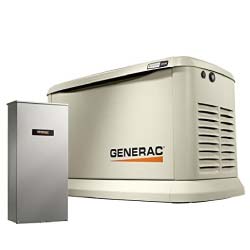
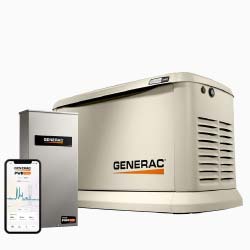
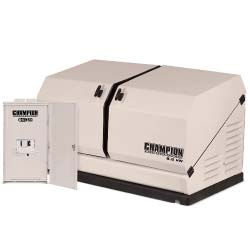
What is a Whole House Generator?
A whole-house generator is a backup power solution that provides power to your house, business, commercial, or industrial applications in the event of a power outage. Whole-house generators are stationary, and they start automatically when they sense no utility power. Their installation is one-time and costly.
List of the Best Standby Generators Of 2024



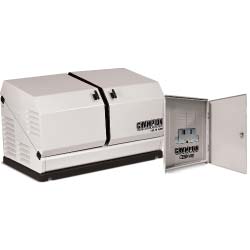
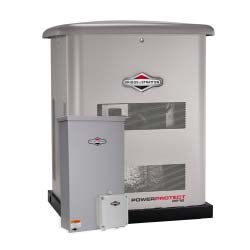
1. Generac Guardian 24KW Standby Generator
FEATURES & SPECS

Generac Guardian 24KW is the largest air-cooled standby generator with a 24000-watt power generation capacity on propane fuel supply.
Homeowners normally look for a compact model that can not only save some utility bills but can handle increased power demands as well.
Generac Guardian 24KW is a very popular choice as a backup power source for residential purposes due to its reliable power output and easy installation.
This model offers a Wi-Fi feature to track the unit’s operation from anywhere.
The power view mode helps you monitor all your power consumption directly from your phone.
The reason this generator is extremely popular is the power coming off of this generator is of utility-scale quality with less than 5% harmonic distortion and constant voltage.
A typical gasoline generator’s fluctuation in voltage and a sudden engine misfire can send dirty power into the house. This dirty power can damage sensitive electronics like microwaves, laser printers, cellphones, and laptops.
That power that comes from a standby generator is called clean or true power because it doesn’t fluctuate and sends overload to sensitive appliances.
The latest models from GENERAC include quiet test mode. Once a week, standby generators automatically start to keep the fuel moving and make sure the battery is working.
The quiet test mode enables Generac Guardian 24KW to work at a lower RPM to keep the noise down and save fuel. The noise is between 67 to 72dB.
The housing is 4 feet long and 2 feet wide which is a bit bigger than most portable gasoline generators, but pretty normal for standby generators.
Generac Guardian 24KW has a strong build with an all-aluminum enclosure.
I conducted a load test and gave it a total load of 21000 watts. I ran everything without changing its noise patterns. I know it can do 24000 watts on propane but I didn’t have more power tools in my garage to go beyond 21000 watts.
Overall, Generac Guardian 24KW is one of the highest-selling whole-house generators with 98% positive reviews. 9.8/10 from me.
2. Champion 8.5KW – Best Whole House Generator Overall
FEATURES & SPECS

Champion 8.5KW is a budget-friendly standby generator with a 50amp outdoor transfer switch, 8500 watts of power on propane, and a 60dB noise level.
The champion brand takes pride in manufacturing high-quality home generators loaded with modern features. Their generators are top-notch in durability and reliability.
This generator is equipped with a 24V starting system which allows it to start smoothly even in extremely cold weather.
I like the anti-weather steel enclosure. One of the farmhouses is in an area where the wear and tear from the weather is very high.
It saved me from a lot of trouble otherwise I had to build a small structure for the generator with proper ventilation to protect the generator from the weather. Champion 8.5KW enclosure saves the day.
When the champion sent me their generator, I ran it for an entire day after a week of installation to check its durability and power output to verify the claim that it could run for an entire day without any problem.
I was able to get close to 8480 watts during the load test. It pretty much ran everything I wanted it to run. The noise never changed since it is a whole-house generator. champion takes special care of their big units.
During my tests, Champion 8.5KW was able to provide 36amps at 240 volts on propane fuel, and 32amps at 240 volts on natural gas.
The alternator used in the Champion 8.5KW produces less than 5% harmonic distortion which is extremely necessary for a whole house generator. The power is clean as a utility line.
3. Generac 22KW – Best Generac Home Generator
FEATURES & SPECS

Generac 22KW is the number #1 selling standby generator. This generator is a total beast with a whopping 22000 watts of power output. It is a complete backup power solution for a standard home.
This brand is using a pressure-lubricated G-force engine whose job is to reduce maintenance costs and start easily within 10 seconds.
The Mobile Link feature allows monitoring the status of our generator on our cellphones or laptop from anywhere in the world. It doesn’t only show us the current operating status, but we can schedule maintenance as well.
Generac home generator 22KW of the Guardian series is the industry-leading air-cooled standby generator. It has the best kilowatt per hour value in the market today.
Whenever it senses power loss, it starts within seconds automatically and runs continuously until the utility power returns.
I installed it for a month or so to review its performance when I received it from the Generac guys. I took a load test after 2 weeks.
I pretty much ran everything I had at the time and pushed the generator to 2198 watts. I noticed a slight change in the noise pattern but nothing significant.
I also conducted a noise test on natural gas. I was able to push the Generac 22KW to 1941 watts and noise patterns didn’t change. I think it performed well on natural gas.
Like its 24KW elder brother, Generac 22KW also features True Power technology that provides uninterrupted and clean electricity to protect your sensitive appliances. The power is as clean as a utility line.
One of the best features of this generator is the Evolution Controller LCD which displays battery status, maintenance schedule, and other stats. It makes life easier.
This model is a bit expensive but the power and reliability it provides are worth every single penny.
4. Champion 12.5KW Home Standby Generator
FEATURES & SPECS

Champion 12.5KW is another quality standby variant from the champion brand equipped with a 100amp outdoor transfer switch (NEMA 3R) that covers 12 circuits.
It will automatically start in case of a power failure. I appreciate that it has a 24V starting system to ensure a smooth start even in freezing cold or boiling hot temperatures.
We all know what a big pain in the ass it is to keep the batteries healthy enough to start when they are sitting for a couple of days. Champion 12.5KW also features a battery tender system to ensure the batteries remain always charged to provide starting power. Batteries are sold separately.
So Champion 12.5KW was installed in my neighbor’s house for a month, and I asked him to let me review it and conduct a load test.
Manufacturer claims it can run a 4-ton AC system without any trouble. I gave it a total load of 1240 starting watts and 10982 running watts.
It ran everything without tripping the overload alarm. I could have pushed beyond 12.5KW starting capacity but the generator is brand new so I decided not to.
Champion generators are not noisy. I didn’t sense any loud pop coming from the generator even when I pushed it to its limit.
Overall I would say Champion 12.5KW is a fantastic whole house generator preferred for a small to the medium house.
5. Briggs and Stratton 12KW Standby Generator
FEATURES & SPECS

This little bad boy is mostly preferred for small houses to power the most essential appliances only. It is a narrow footprint unit with 12000 power.
Briggs and Stratton 12KW has an automatic voltage regulator which is very necessary for large units. Its alternator is very efficient.
I checked the harmonic distortion and each time it was less than 5%. A standby generator needs to produce power that matches the utility line’s clean power to protect sensitive appliances like cellphones, printers, projectors, laptops, microwaves, etc.
I also appreciate the smartphone app’s control over WI-FI. Wireless monitoring gives so much flexibility to the user.
Briggs and Stratton 12KW also runs on low RPM mode when the load is not high to save fuel, and reduce noise.
This generator becomes 75% quieter during the weekly test mode to save fuel and reduce friction.
So the company claims it has 30% fewer footprints compared to other competitive generator brands, offering a variety of installation options.
After doing a little bit of research, I found out the footprints are not 30% less but close to 25% which is not bad at all.
It is a bit pricy than similar units but I don’t think you will regret the decision once you use it. Briggs and Stratton 12KW doesn’t eat much fuel and produce a high power output.
So I conducted a load test and ran a few ACs, a pump, a microwave, a fridge, and a few other power tools and appliances to get close to 12000 watts of power.
Surprisingly, Briggs and Stratton 12KW ran everything without tripping the overload alarm. Now I did notice a slight change in the noise pattern like it was pushing itself, but the overload alarm never went ON.
If you have a small family and a small house and if only want to run essentials during power outages, then Briggs and Stratton 12KW is the best choice for you.
How to Buy The Best Whole House Generator?
I and my team have compiled a list of things to be considered before purchasing a standby generator. These things will help you to choose the best whole-house generator for yourself.
1. Power Requirement of the House – Calculate the Watts:
Before even thinking about a whole house generator, the most important thing is to calculate the total power consumption of your house.
To do that, you would need to calculate the watts of your appliances. It is a very simple formula to calculate the watts of any appliance.
Watts = Volts x Amps
For example:
Your refrigerator’s label is saying 6 amps and 120V.
Watts = Volts x Amps
= 6 x 120 = 720 watts.
Find the wattage label and use the formula to calculate the wattage of your appliances, but before you have to understand the starting and running watts.
Starting Watts and Running Watts:
Starting or peak watts are extra watts needed for a few seconds to start motor-driven devices such as power tools to overcome inertia.
Rated or running watts are watts needed for a device or tool to run continuously.
After calculating the total watts of your appliances, multiply it by 1.5. Suppose the total power consumption of your house is 5000 watts, then purchase a generator with 7000 watts capacity.
We leave some margin of safety. A few extra hundred watts are always required because some appliances need more power (starting power) to start.
I have mentioned starting and running watts of some of the popular appliances in a home.
Home Appliances and their Power Consumption
| Appliances | Running Watts | Starting Watts |
|---|---|---|
| Window air conditioner | 1,200 | 1,800 |
| Electric blanket | 200 | 200 |
| Dehumidifier | 240 | 240 |
| Space heater | 600 to 1,500 | 600 to 1,500 |
| Vacuum | 300 | 500 – 600 |
| Home theater | 300 | 400 – 500 |
| Sump pump | 800 | 1,500 to 3,000 |
| Well pump | 1,000 | 2,000 to 4,000 |
| Coffee maker | 800 – 1000 | 1000 – 1200 |
| Air fryer 1500w – 1500 starting watts. | 1500 | 1500 |
| Electric pressure cooker | 1000 | 1000 |
| Toaster | 850 | 900 – 1000 |
| Dishwasher | 350 | 400 – 500 |
| Electric stove | 1,500 | No surge requirement |
| Electric kettle | 1500 | 3000 |
| Lawnmower | 1000 | 1500 |
2. Engine Type. Air-Cooled vs Liquid-Cooled
A liquid-cooled generator type pumps the coolant agent through the engine block which absorbs heat before moving to the radiator where the coolant cools down and repeats the cycle.
An air-cooled generator type uses surrounding air to cool down the engine. Some generators use fans to blow air across the engine to cool it down.
Liquid-cooled engines are more efficient than air-cooled. They work best in hot climates with over 100F degrees temperature.
Not all are air-cooled but some cheaper models are likely to shut down due to overheating
3. Fuel Type and Performance:
Big whole-house generators are permanently installed on your property. They are stationary. They are connected to the natural gas utility pipeline or liquid propane tank installed beside it.
As long as the main gas utility line is working, you don’t need to worry about fuel shortage. Natural gas is efficient and it burns cleanly.
The biggest downside of natural gas generators is the unavailability of pipelines in off-grid areas. Another downside is that natural gas is the first utility line to be shut off during natural disasters to prevent fire or explosion hazards.
Propane provides more when it burns compared to natural gas and it burns cleanly and efficiently. It is less expensive as well.
Propane provides 2516 BTUs per cubic foot, and natural gas provides 1030 BTUs per cubic foot.
A diesel standby generator is another choice. Diesel has the biggest energy diesel compared to natural gas or propane, but it is dirtier and more expensive.
4. Noise Levels:
A whole house generator is permanently installed, you cannot move it. The noise level is very important. Anything in the range of 60 to 65dB is considered a standard, but anything above that is annoying.
Standby generators are generally quieter compared to most portable generators, but I would suggest paying extra attention to the noise label. You cannot move the generator to a different location to quiet it down. The most you can do is to make a soundproof box.
5. Warranty:
A whole house generator is a very heavy investment, and a 5 to 10-year warranty is very necessary in case of any fault. The warranty should cover labor and parts costs.
Some warranties also cover travel costs for the technician to tune up the generator, but that depends on the brand and model type.
The bottom line is, that a good warranty is important for large investments.
Recommended Read: Does a whole house generator adds value to the home?
Drawbacks of a Whole House Generator?
Frequently Asked Questions – FAQs
What is the best standby generator?
Generac 22KW is the best standby generator on our list. This generator is a total beast with a whopping 22000 watts of power output. It is a complete backup power solution for a standard home. It is reliable, durable, and efficient with less than 5% harmonic distortion to protect sensitive appliances. Generac Home generators are the best among the whole house series.
What size standby generator is needed to run a whole house?
An average U.S. home requires 5500 to 7500 watts to power essential appliances, but we calculate the actual wattage requirement for our house by using the formula “Watts= Volts x Amps”. If your home’s actual requirement is 8000 watts, then purchase a 10000-watt unit. Always get a few extra hundred watts as a safety precaution.
What is the average installation cost of a whole-house generator?
The average cost is between “$1500 to $7000″ including the labor cost and travel cost. But, the actual installation cost of a standby generator depends on the brand, model, and area. Some brands cover the installation and labor costs as well. In a nutshell, whole-house generator installation is a bit costly.
Can I plug my standby generator into a wall?
Never plug the generator cord directly into the wall. The risk of back-feeding power into a utility line or electrocution is very high. Install an automatic transfer switch. That is the best way for a whole-house generator. It is a bit tricky job, hire a professional to do it for you to avoid any hazards.

Alex Black is a seasoned electrical engineer with a remarkable 8-year track record specializing in appliances, generators, and transfer switches. With extensive hands-on experience in the field, Alex possesses a deep understanding of electrical systems and their intricate workings. Throughout their career, Alex has consistently demonstrated expertise in designing, troubleshooting, and maintaining various electrical appliances.
